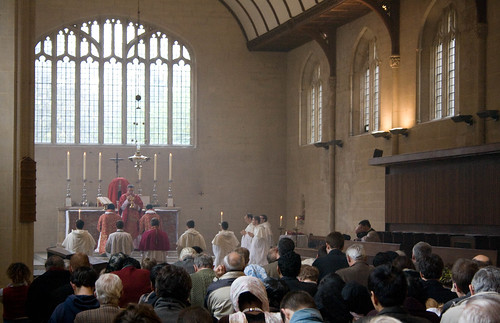 |
| Fr Dominic Jacob Cong. Orat. celebrating a High Mass for the LMS Pilgrimage to Oxford in 2008, in Blackfriars, in the presence of Bishop William Kenney. |
Bournemouth is an important center of population in Portsmouth Diocese, spilling over into Plymouth Diocese. Thanks to persistent local demand, a monthly Traditional Mass has been established there. We can expect the new Oratory to provide a more complete provision for the EF, as all the other Oratories in England do for their parishes.
This will bring the total number of Oratories of St Philip Neri, plus 'Oratories in formation', in England and Wales not to six, as the Catholic Herald suggested, but to seven. In addition to the long-standing Oratories in Birmingham and London, and the more recent foundation in Oxford, 'Oratories in formation' have or are being created in York, Manchester, Cardiff, and now Bournemouth. The rapidity of this growth is astonishing. It testifies to the new situation in the Church in England, a new openness to such foundations, and the availability of vocations to fill them.
This revival, with its emphasis on good liturgy, including the Traditional Mass, the availability of confession, and orthodoxy, is slowly transforming the Church in England from below.
Support the work of the LMS by becoming an 'Anniversary Supporter'.
Fantastic news. I used to be a regular at a parish served by the Toronto Oratorians and it was one of a handful of liturgically decent places in the Archdiocese!
ReplyDeleteI wondered at first why Bournemouth was picked as the base for the new Oratory rather than Southampton, Portsmouth or indeed Reading (the other three big population centres in Portsmouth Diocese). The fact that Bournemouth straddles the diocesan boundary with Plymouth, and Bishop O'Toole's is also known to be interested in bringing in traditionally-minded communities to his diocese, may be significant.
The CH is nevertheless correct insofar as it refers consistently, for whatever reason, only to Oratories in England. Cardiff, being the capital of Wales, is not in England.
ReplyDeleteI think most of us are pretty well aware of Cardiff's location; England and Wales are united for ecclesial purposes, having but one episcopal conference and one set of interdiocesan bodies. Their civil distinction is irrelevant for Church purposes, just as the Irish border is to, say, the dioceses of Armagh, Derry, Clogher etc.
Delete"England and Wales are united for ecclesial purposes" indeed, but into the Catholic Church in England & Wales, not "in England" to which the CH refers in the cited article. Both the CH and Joseph are therefore correct: 6 Oratories in England; 7 Oratories in England & Wales.
DeleteFrancis: Portsmouth and Reading also already have reasonably well established Traditional Mass provision (at the Cathedral and by the FSSP respectively) so this is effectively expanding coverage. Great news.
ReplyDeleteThe rapidity of this growth is astonishing. It testifies to the new situation in the Church in England, a new openness to such foundations, and the availability of vocations to fill them.
ReplyDeleteAs with the explosion of Oratories in the United States in the last few years, I think it also attests to a growing desire by secular diocesan priests for a more supportive form of life in a Church where that is becoming harder and harder to come by. As dioceses run ever more short of clergy and priests are increasingly required to administer multiple parishes (or merged parishes in multiple locations) and reassignments become more frequent, priests see the Oratory as a model of stability and community life in which they can live out their vocations more fruitfully.
This comment has been removed by the author.
Delete